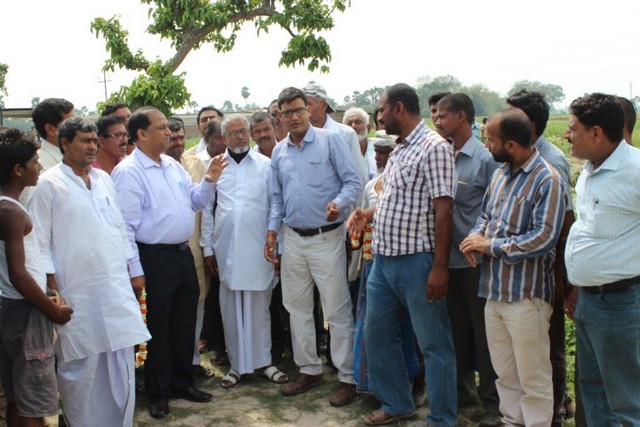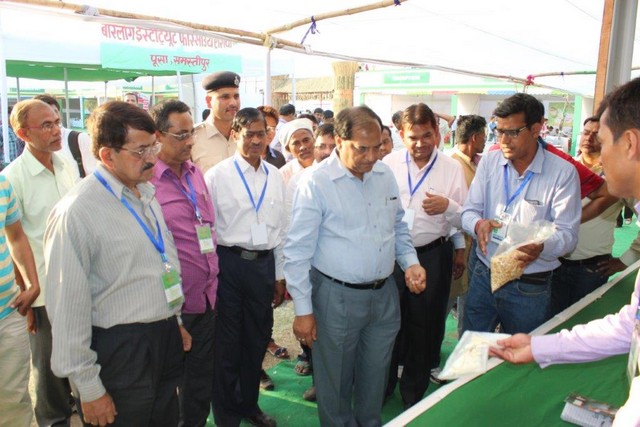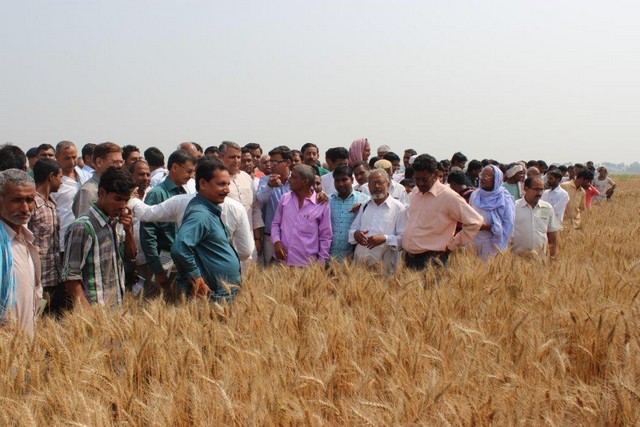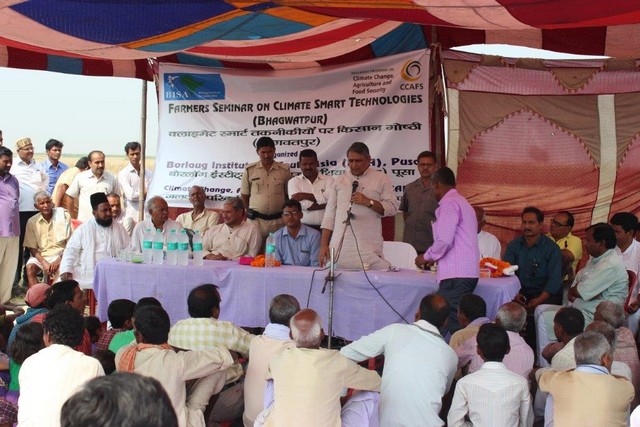BISA-CIMMYT catalysing policy makers to promote climate smart agriculture practices in Bihar

The Borlaug Institute for South Asia (BISA) and CIMMYT in close collaboration with NARS and other stakeholders are developing, adapting and scaling up the conservation agriculture (CA) based climate smart agriculture technologies in South Asia. In the stress prone poverty corridor of the eastern Gangetic plains, large number of stakeholders including small holder farmers are deserving the benefits of BISA-CIMMYT by getting quality seed, trainings and exposure visits to participatory technology adaptation modules and climate smart villages. For mainstreaming innovations, technologies and approaches in the agricultural development plans of the governments, through creation of awareness among a range of stakeholders, efforts were made to expose potential technologies to policy makers and the scientific community. During the winter season of 2014-15, several key policy planners and change agents visited the BISA research farm at Pusa as well as linked climate smart villages and saw promising climate smart technologies. The Director Agriculture, Government of Bihar Dharmender Singh (IAS) along with the district collector of Samastipur, M. Ramchandrudu (IAS) and several officials of Bihar state agriculture department visited BISA farm on December 30, 2014. Raj Kumar Jat and ML Jat explained the research and development activities taken up by BISA. They showed the research trials on zero-tillage potato + maize, early planted dual purpose wheat, precision nutrient management in maize-wheat system under CA, genotype and management interaction in wheat, crop intensification in rice-wheat system by introducing mung bean, maize + pigeon pea + wheat inter-cropping systems, etc. The Director Agriculture was convinced of the promising technologies developed by BISA-CIMMYT and assured support to BISA-CIMMYT for the propagation of these technologies to the farmer. His comments in visitor book are
Visited BISA farm. Discussed the current activities, research and production works. It is very encouraging to see the trials of new upcoming technology. BISA administration was advised to submit the current activities and future plan to state government. A plan of collaboration with state should be submitted soon so that we can work together. Exposure visits and training of farmers should be done on the farm. Please submit the seasonal report of activities to state government. We will be ready to support. All the best for future.”

On February 02, 2015, John W Snape, Chair, CIMMYT Board of Trustees; Thomas A lumpkin, Director General CIMMYT, Hari Shanker Gupta, Director General, BISA; Ms Nicolle Birrell, Member, CIMMYT Board of Trustees and Etienne Duveiller, Director of Research, CIMMYT-South Asia visited BISA, Pusa and had a meeting with the chief minister of Bihar and higher level officials next day. The government representatives from Bihar included Amrit Lal Meena, Principal Secretary to the Chief Minister, Tripurari Sharan, Principal Secretary of Agriculture, Dharmendra Singh, Director of Agriculture and Gopal Singh, Officer on Special Duty to the Chief Minister.
During the meeting, Lumpkin emphasized the need for quick transfer of relevant technology to Bihar farmers. Technologies like direct seeded rice and zero-till wheat were identified as preferable options to conventionally transplanted rice and wheat, which are both labor and energy intensive. With direct seeding, rice seed is sown and sprouted directly into the field, eliminating the process of planting seedlings by hand while reducing the labour and water use. Zero-till wheat allows farmers to directly sow wheat seed into the soil and residues from previous crops without tilling. This allows farmers to plant seed early, and avoid losing yields due to pre-monsoon heat later in the season. Lumpkin also highlighted the important role BISA could play in capacity building of farmers and extension workers to test and promote innovative agriculture technologies. During the discussion, an emphasis was made to scale-out the technologies in a community based approach through piloting climate smart villages in each block of Bihar.
On March 02, 2015, Mangla Rai, former Director General of ICAR & Agriculture Advisor to Chief Minister of Bihar and Ravinder Kaur, Director, Indian Agricultural Research Institute visited the BISA farm at Pusa and were excited to see conservation agriculture practices.
Rai’s comment was: “I could understand conservation agriculture better than ever before after seeing the crop and crop geometry in the field today. Grateful for good work.”
The Agriculture Production Commissioner (The highest officer of the State Agriculture Department) of Bihar, Vijoy Prakash (IAS) visited the BISA farm at Pusa on March 14, 2015 and saw the innovative technologies developed by BISA. He emphasized on propagation of these technologies on a large scale. His comments in visitor book are :
“Today I had an occasion to visit BISA and its farm. I saw the new methods of sowing paddy, wheat and mung bean. The methods developed by the Institute appear quite promising and need to be discussed for propagation on a large scale. The scientists are quite learned and enthusiastic. I congratulate them for good work. Keep it up.”

He also visited one of Borlaug climate smart villages (Digambra, Samastipur) and interacted with farmers and discussed about the climate smart practices adopted by the farmers. BISA, CIMMYT-CCAFS (Climate change agriculture and food security) in collaboration with local stakeholders and farmer groups developed 15 Borlaug climate smart villages (CSVs) in Samastipur district and 20 in Vaishali district where farmers are adopting water, nutrient, energy, carbon, weather and knowledge smart technologies.
During the 3 day Bihar festival ( March 22-24) BISA-CIMMYT had put up an exhibition stall of new conservation agriculture practices and live demonstration of quality protein maize (QPM) based food products (Tortia, Jalebi, Pakora and flour). More than 10 thousand farmers /visitors enjoyed QPM food items. The Agriculture production commissioner, Sh Vijoy Praksh and other official of the Bihar government again discussed the new agriculture practices developed by BISA-CIMMYT with the farmers. The Agriculture Production Commissiner was keen to introduce the conservation agriculture practices in the state government’s agricultural technology dissemination programme.

On March 04, 2015, Hari Shanker Gupta, Director General, BISA and Raj Kumar Jat met with the Agriculture Minister of Bihar Vijay Chaudhary and discussed with him the current issues faced by small holder farmers of Bihar and the innovative technologies required to improve crop productivity and resource use efficiency in Bihar.
On March 26, the Agriculture Production Commissioner Vijoy Prakash called a meeting, which was attended by the Principal Secretary of Commercial Taxes, principal Secretary of Revenues, Managing director of Bihar State Electricity Board and the Director Agriculture to resolve the issues related to BISA. Raj Gupta and Raj Kumar Jat represented the BISA. The concerned departments assured support for BISA related issues at the earliest and agreed to create a separate budget to support BISA. The Agriculture Production Commissioner and the Director Agriculture acknowledged the important role played by BISA to develop the new innovative technologies in such a short time period. They also agreed with and accepted the two proposal submitted by BISA (one for a training hostel and the other for research).
On March 28, BISA and CIMMYT-CCAFS organised a field day on conservation agriculture practices at Bhagwatpur village of Samastipur district of Bihar.

The Agriculture Minister of Bihar, Vijay Chaudhary, was the chief guest of the function. N K Singh, Professor and Head, Department of Plant Breeding and Genetics, Rajendra Agriculture University, Pusa gave an overview of the possibility of direct seeded rice in Bihar. Raj Kumar Jat of BISA, gave a presentation on how to increase the cropping intensity of Bihar by 300%. Raj Kumar said was possible by timely planting (first fortnight of June) of short/medium duration rice varieties with direct seeding technique followed by early planting (last week of October) of suitable wheat varieties under zero tillage and then timely planting (last week of March) of summer mung bean crop under zero tillage. This technology was climate resilient and could help escape the terminal heat in wheat and save the resources. The Agriculture Minister was convinced of the new techniques and asked the farmer and the state agriculture extension officers to fast adopt these technologies. He acknowledged that zero tillage wheat already became popular in Bihar and emphasized the need to provide more training to farmers to adopt direct seeded rice. He instructed to state agriculture officials to organize more trainings on direct seeded rice for fast dissemination of the technology. He along with 600 farmers and officials visited the wheat crop planted under zero tillage in a climate smart village and appreciated the efforts made by the farmers and scientists.
